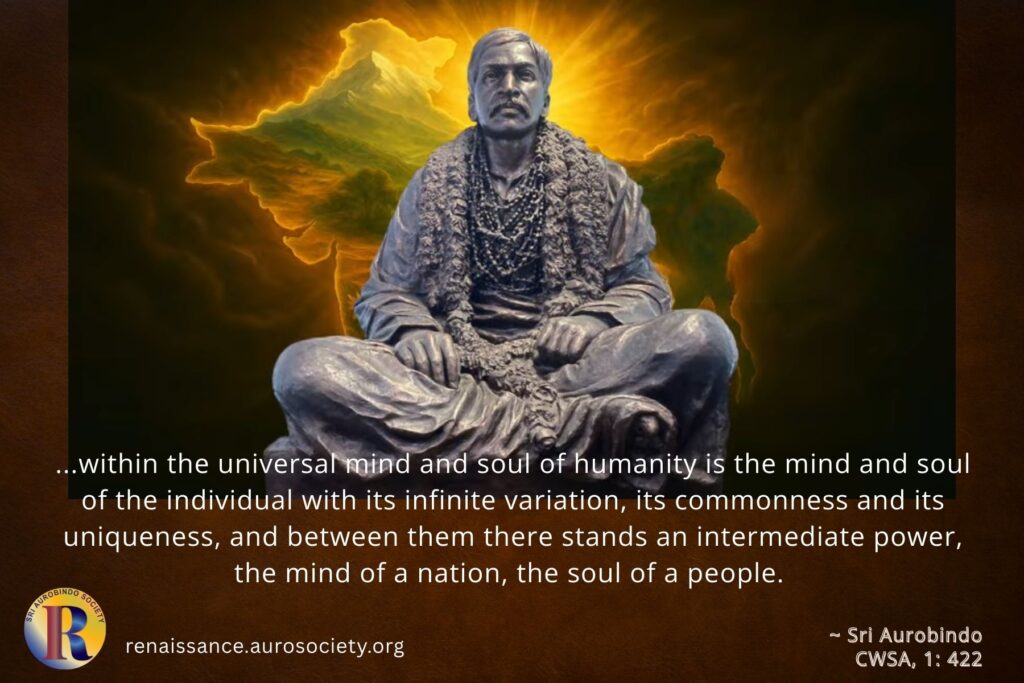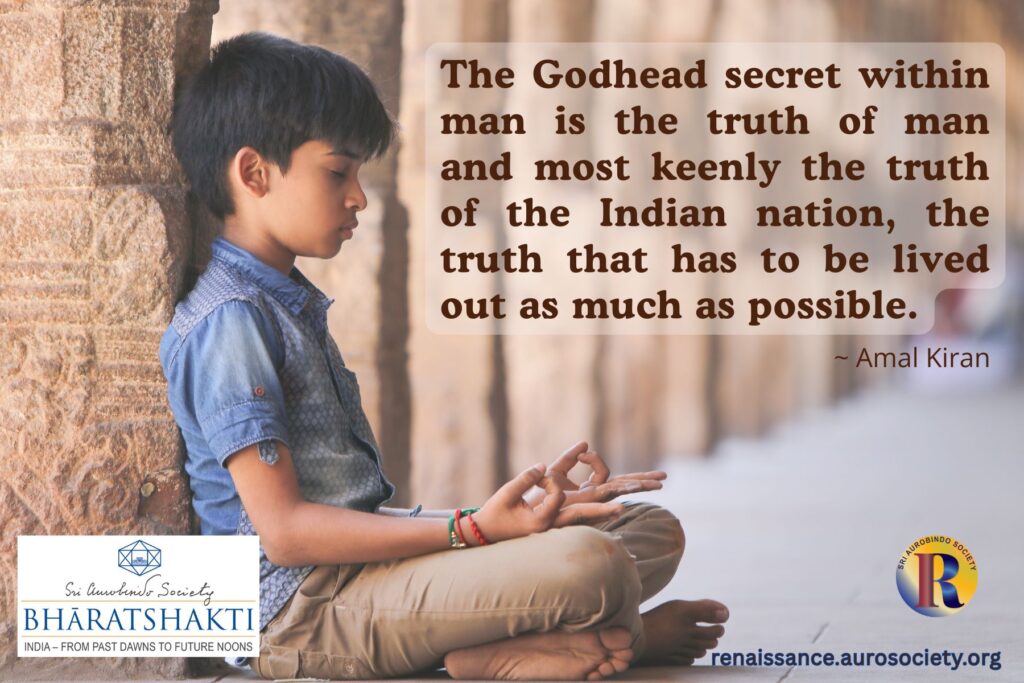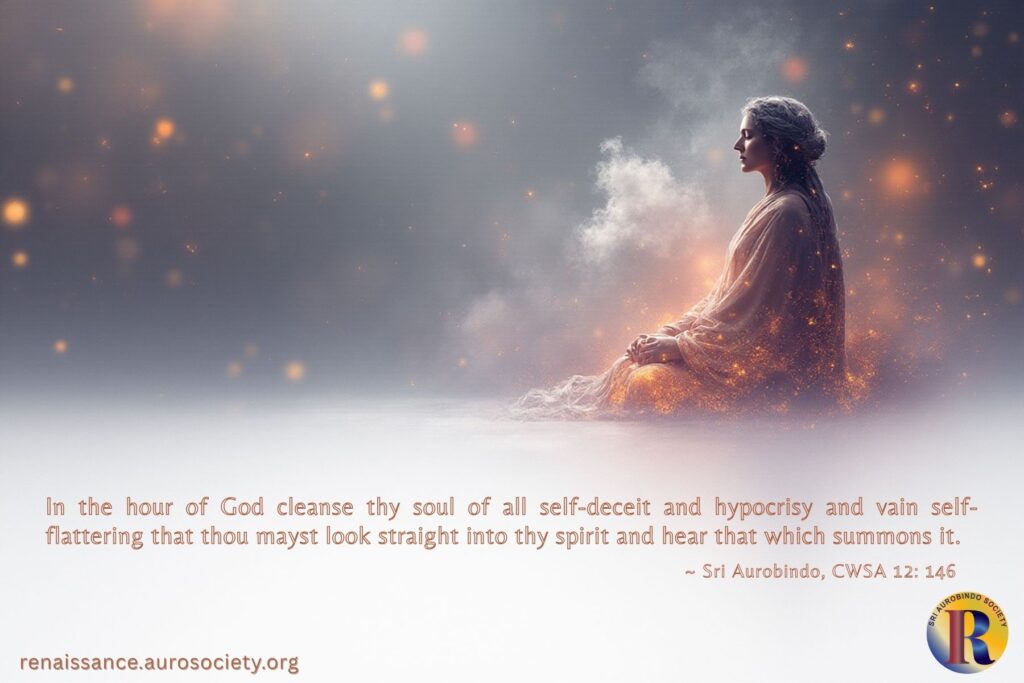Volume 6, Issue 7-8
Author: Beloo Mehra
Greetings for this special month of August!
On this birthday of Sri Aurobindo, and also of the modern nation of India that is Bharat, we must take a closer look at the work ahead. The modern nation-state of India carries deep within herself the truths of a millennia old civilisation. As modern India inches toward her 100th birthday, which will be 175th birthday of Sri Aurobindo, we must regain a solid grounding in the eternal spirit which has for long nourished and enriched this land, its people, its culture — materially, intellectually, and spiritually. This recovery requires sādhana, it necessitates tapasyā – at individual and collective levels.
WATCH
This sādhana involves doing all work as yajña, as offering to the Divine and the Divine manifesting in Mother India. In one of his incomplete commentaries on Isha Upanishad, Sri Aurobindo explained what it means to be a Karmayogi. It does not matter what works one does – however humble or mighty. What matters is the spirit in which a work is taken up, and the attitude of the worker. The criteria includes the following:
- work to be done not for oneself but for God in man and God in the world
- slaying the sense of egoism in all works and feeling them to be not one’s own but the Lord’s
- put from oneself alike the coward’s shrinking from death and the coward’s longing for death
- suffering neither the lust of long life nor impatience of its vanities & vexations, but living out one’s full term bravely, modestly, selflessly and greatly
He says, “…then indeed he becomes the Karmayogin who lives ever close to the eternal & almighty Presence, moving freely in the courts of God, admitted hourly to His presence and growing always liker & liker in his spiritual image to the purity, majesty, might and beauty of the Lord.” (CWSA, 17: 216)
This is exactly how Sri Aurobindo approached all his works – as a revolutionary nationalist, teacher, journalist, mystic, writer, poet, philosopher, or even as a prisoner! We see the spirit of a true Karmayogin in Baroda, Bengal, and Pondicherry. He had said this in plain words as early as 30th August, 1905 in the famous letter to his wife. He wrote about all his education, knowledge, wealth, everything belonging to God and his Mother India.
We recall a speech delivered by Sri Aurobindo on 19th January 1908 at Bombay. He reminded the audience that there is something that “must come from you which is to save the whole world”. What was that “something”? He clarified:
“That something is what the ancient Rishis knew and revealed, and that is to be known and revealed again today, it has to be revealed to the whole world, and in order that He may reveal Himself, you must first realise Him in yourselves, you must shape your lives, you must shape the life of this great nation so that it may be fit to reveal Him and then your task will be done, and you will realise that what you are doing today is no mere political uprising, no mere political change, but that you have been called upon to do God’s work.”
Imagine the deep significance of this!
This is the time when our national consciousness which had been lying dormant for centuries had suddenly awoke. The leading voice of this new awakening was emphasising that this dawn must be built on the fundamental truths of India’s spiritual culture. He was highlighting the need for cultivating a spiritual orientation towards life. He was asking Indians to cultivate a dynamic faith in the guiding Divine Spirit. He was speaking of developing an attitude of a sādhaka who is seeking the Divine through all life and work.
Sri Aurobindo’s work of awakening the national consciousness was one with his work of leading the renaissance of Indian culture. But he was doing all this in a living manner, not merely in theory. He was able to inspire in the people the power of a living faith in the spirit of Indian culture. He was awakening them towards the need for self-preparation to contribute to India’s destined work for humanity.
Sri Aurobindo’s patriotism was not of a narrow partisan variety. It was not of the kind which makes one attached to one’s country and regard it as the greatest and best. He truly worshipped Mother India. But it was because he knew that India was destined to be the custodian of the supreme knowledge. He was convinced that India must be the leader of the world in the ways of the Spirit. Her freedom was seen by him in the larger context of the destiny of the human race.
Sri Aurobindo explained that “the next state in the human progress is not a material but spiritual, moral and psychical advance” (CWSA, 6: 572). He emphasised that the highest values of progress, liberty, equality and fraternity could never be realised if they remained only as intellectual ideals. The highest ideals of reason, science, practical efficiency, a just political, social and economical order, and of the human unity could never become reality if they only relied on the power of the idea and sentiment. The real truth and practice of these ideals and values can only be founded in the spirit.
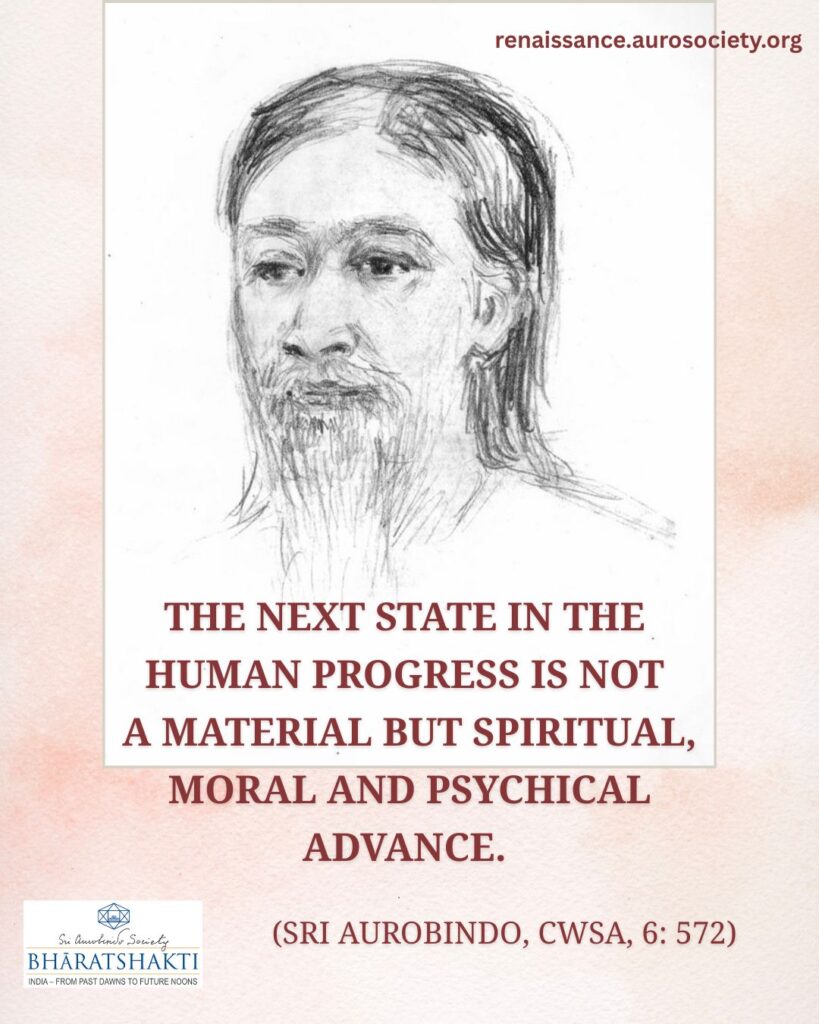
This is why he emphasised that that the most essential work required for the rebirth of India is the recovery of the old spiritual knowledge and experience in all its splendour, depth and fullness. Then only India can march towards addressing the modern problems of mankind in the true light of that spiritual knowledge and experience.
This necessitates that education and all other organised systems that communities and societies formulate to effectively prepare their younger generations must be guided by an integral approach to human development. There need not be a separation between intellectual and spiritual preparation for life, or a spiritual life and ordinary life. The time for such binaries is gone. All life is one, and all life must become a field for integral progress of the being. This is the new spiritual ideal we have from Sri Aurobindo and the Mother.
“…the spiritual and intellectual divorce from the past which the present schools and universities have effected, has beggared the nation of the originality, high aspiration and forceful energy which can alone make a nation free and great. To reverse the process and recover what we have lost, is undoubtedly the first object to which we ought to devote ourselves. And as the loss of originality, aspiration and energy was the most vital of all these losses, so their recovery should be our first and most important objective.”
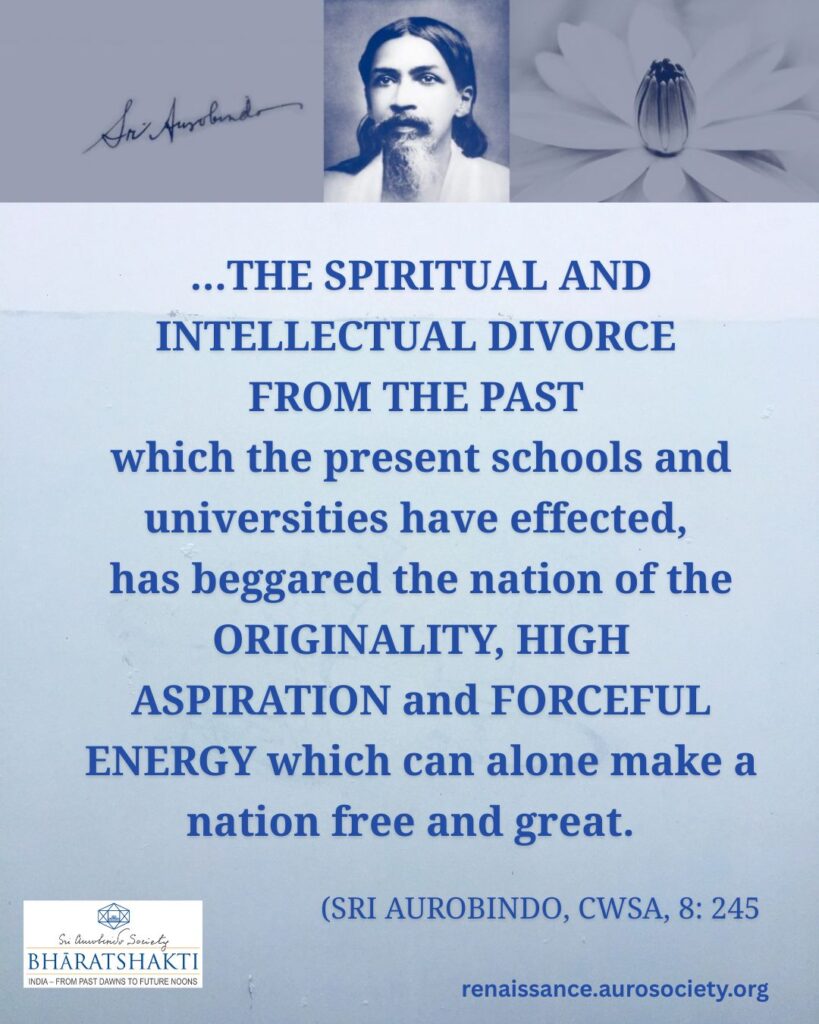
The New Ideal:
Social and Cultural Perspectives
A New India is fast rising. But will this New India be like all other nations concerned only with economic, military and political might? Or will this rise be a genuine rebirth of the timeless spirit which made India one of the greatest civilisations in the human history?
Much depends on how we Indians rededicate ourselves to that great spiritual ideal which has been “the characteristic idea and aspiration of India”. Through many of his writings, Sri Aurobindo reminds us of that spiritual ideal. But more importantly, he invites us to participate in the work of giving a new orientation and a new form to that ideal – one that is needed for the new India and the work she has to do for human race.
In a short but highly impactful essay titled The Age of Sri Aurobindo, Nolini Kanta Gupta writes that the ideal of the Life Divine may appear difficult or chimerical to the normal mind. But he emphasises, this has always been the preoccupation of the inner being of man.
In an editorial dated published in Bande Mataram on 8th June 1907, Sri Aurobindo gives a deep insight into the immense power that an idea holds within itself to shape the world’s destiny. The context in which this piece was first written – the despotic British colonial rule – may have changed outwardly. But the relevance of the timeless truth expressed through the forceful words of Sri Aurobindo continues to this day. We, as a nation, are not living under a foreign rule. But the threat of several anti-evolutionary, hostile forces – internal and external – is very real.
These despots of today come in various shades – political, religious, intellectual. And one of their biggest tool today is the power of narrative. In this context, a close reflection on the “strength of an idea” as enunciated by Sri Aurobindo becomes deeply necessary. The only way to challenge a despotic narrative is to counter it with one which is truly aligned with the spirit of the evolutionary march of human progress. It must never be bound by any regressive or anti-evolutionary ideologies or belief-systems.
This writing of Sri Aurobindo becomes our Guiding Light as we embark on a new series in the upcoming issues of Renaissance. The new series, The New Ideal: Some Socio-Cultural Perspectives will explore some of the constructs, contexts, and challenges of modern collective life in the psycho-spiritual vision of Sri Aurobindo and the Mother.
Sri Aurobindo, the Politician
For this special issue of August 20025, we have also included two features highlighting the work of Sri Aurobindo during his revolutionary days. As we know, he revolutionized Indian politics of the time. Until his advent, the politics of the day was mostly following a mendicant policy. It was Sri Aurobindo who gave a clarion call and firmly demanded Complete Independence. The colonial government of the time was so afraid of him that they spoke of him as “most dangerous” adversary.
The excerpt from Sujata Nahar’s Mother’s Chronicles, volume V highlights the mighty ‘journalistic’ pen of Sri Aurobindo which he used so effectively to awaken the nation. We also feature an eye-witness account by V.V. Athalye who was present at the Hooghly Conference. This excerpt reveals the character and attitude of Sri Aurobindo as a politician when he was leading the Nationalist Party. The original book in Marathi titled Atma-Vritta (My Life-Story) was translated into English by S. Kuppuswamy. This was published earlier in the August 1972 issue of Mother India.
Finally, in a contemplative piece titled India Between Memory and Myth: Resurrecting the Future of Sri Aurobindo’s Dream, Sunil Kumar helps us reimagine a new India and reminds us of the essential work that is necessary for the rebirth of India’s timeless spirit in new forms. We hope our readers will enjoy going through the various offerings in this issue. As always, we offer this work at the lotus feet of Sri Aurobindo and the Mother.
In gratitude,
Beloo Mehra (for Renaissance Editorial Team)
~ Design: Beloo Mehra

